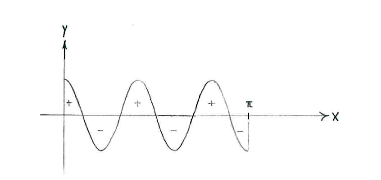Solution 2.2:2a
From Förberedande kurs i matematik 2
m (Lösning 2.2:2a moved to Solution 2.2:2a: Robot: moved page) |
m |
||
| (One intermediate revision not shown.) | |||
| Line 1: | Line 1: | ||
| - | + | The integral is a standard integral, with <math>5x</math> as the argument of the cosine function. If we therefore substitute <math>u=5x</math>, we obtain the “correct” argument of the cosine, | |
| - | < | + | |
| - | + | ||
| - | + | ||
| - | < | + | |
| - | + | ||
| + | {{Displayed math||<math>\int\limits_0^{\pi} \cos 5x\,dx = \left\{\begin{align} | ||
| + | u &= 5x\\[5pt] | ||
| + | du &= (5x)'\,dx = 5\,dx | ||
| + | \end{align}\right\} = \frac{1}{5}\int\limits_0^{5\pi} \cos u\,du\,\textrm{.}</math>}} | ||
| + | |||
| + | As can be seen, the variable change replaced <math>dx</math> by <math>\tfrac{1}{5}\,du</math> and the new limits of integration become <math>u=5\cdot 0=0</math> | ||
| + | and <math>u=5\cdot \pi = 5\pi\,</math>. | ||
| + | |||
| + | Now, we have a standard integral which we can easily compute, | ||
| + | |||
| + | {{Displayed math||<math>\frac{1}{5}\int\limits_0^{5\pi} \cos u\,du = \frac{1}{5}\Bigl[\ \sin u\ \Bigr]_0^{5\pi} = \frac{1}{5}( \sin 5\pi -\sin 0) = \frac{1}{5}(0-0) = 0\,\textrm{.}</math>}} | ||
| + | |||
| + | |||
| + | Note: If we draw the graph of <math>y=\cos 5x</math>, we see also that the area between the curve and ''x''-axis above the ''x''-axis is the same as the area under the ''x''-axis. | ||
[[Image:2_2_2_a.gif|center]] | [[Image:2_2_2_a.gif|center]] | ||
Current revision
The integral is a standard integral, with \displaystyle 5x as the argument of the cosine function. If we therefore substitute \displaystyle u=5x, we obtain the “correct” argument of the cosine,
| \displaystyle \int\limits_0^{\pi} \cos 5x\,dx = \left\{\begin{align}
u &= 5x\\[5pt] du &= (5x)'\,dx = 5\,dx \end{align}\right\} = \frac{1}{5}\int\limits_0^{5\pi} \cos u\,du\,\textrm{.} |
As can be seen, the variable change replaced \displaystyle dx by \displaystyle \tfrac{1}{5}\,du and the new limits of integration become \displaystyle u=5\cdot 0=0 and \displaystyle u=5\cdot \pi = 5\pi\,.
Now, we have a standard integral which we can easily compute,
| \displaystyle \frac{1}{5}\int\limits_0^{5\pi} \cos u\,du = \frac{1}{5}\Bigl[\ \sin u\ \Bigr]_0^{5\pi} = \frac{1}{5}( \sin 5\pi -\sin 0) = \frac{1}{5}(0-0) = 0\,\textrm{.} |
Note: If we draw the graph of \displaystyle y=\cos 5x, we see also that the area between the curve and x-axis above the x-axis is the same as the area under the x-axis.

